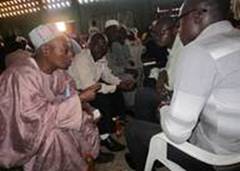The DNA Local Network in Africa, called Transforming Nations Alliance, has launched a dynamic Church-Based Community Transformation project in Uganda, and preliminary reports show that transformation is on its way.
Last week, leaders from about 20 local Ugandan churches came together for an initial training, and the power of unity was easy to see:
“I have been a church leader for many years, but I have never sat or participated with other church leaders from different denominations, especially from my village, in a training. I now strongly believe that if we work together as believers, the kingdom of God will be advanced faster.” -Ugandan pastor
Brief overview of the program
Over the next five years, the DNA in Africa will partner with 40 rural and urban (Kampala) churches, equipping them to become powerful, kingdom change-agents, using their own resources to bring hope, love and healing while addressing the most critical needs in their communities.
The program will walk leaders from these 40 churches through 10 training modules that expand on these three general areas:
- Overcoming cultural lies with biblical truth → The program uniquely integrates a wholistic approach to ministry with an emphasis on worldview transformation that identifies and replaces satanic distortions—the root causes of poverty and brokenness—with biblical truth.
- Wholistic community outreach → Trained churches will apply what they’ve learned by reaching out to their communities through “Seed Projects” that demonstrate God’s love in practical ways, using local resources.
- Developing basic life skills → Church members will receive trainings on health, money management, marriage and family, evangelism, and discipleship–all from a distinctly biblical perspective. They will be equipped to demonstrate these things to other community members.
A tested model of community transformation
The Church-Based Community Transformation model builds upon an exciting program in Southeast Asia that, over the past several years, has seen unprecedented community improvements and truly miraculous moves of God. Starting with 30 local churches, the program has now grown to include more than 700 churches. As a result of the training, churches and their communities have experienced an array of measurable, positive changes, including increased income, improved health, higher-quality primary education, decreased community conflict, increased conversion rates, increased church attendance, and increased tithing. Click here to read one amazing story! All of this has taken place in areas where the church is oppressed. Today, government officials acknowledge the positive impact these churches have brought to their communities.
For more details on the DNA’s Church-Based Community Transformation program,
please e-mail info@disciplenations.org.

















